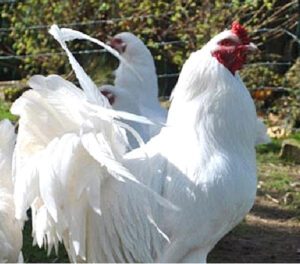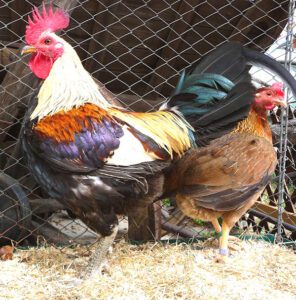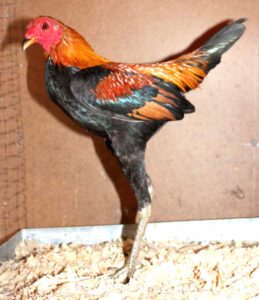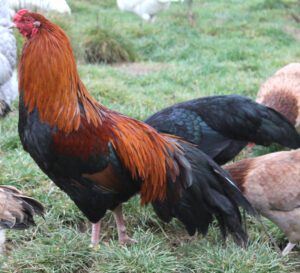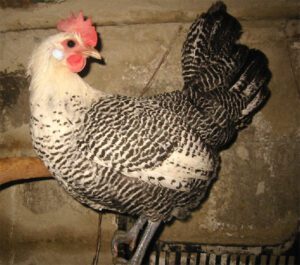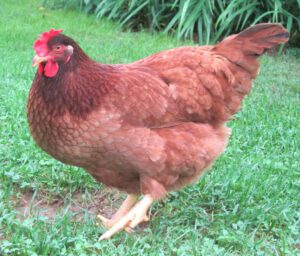Plymouth Rock chicken is a dual purpose breed suitable for both meat and eggs production. It was originated in the United States. This breed is also known as some other name such as Rocks or Barred Rocks. It comes with a variety of colors and the birds are cold hardy and a great breed for small farm or for raising in backyard. The Plymouth Rock was developed in New England in the middle of the 19th century and was first exhibited as a breed in 1849. Most of the farmers raise them as a dual purpose breed and they are valued for both of their meat and egg laying ability.
The first Plymouth Rock chicken was barred and other varieties were developed later. This breed is very popular in the United States and some other countries. The main reason of it’s popularity is it’s qualities. Plymouth Rock is an outstanding farm chicken breed which is popular for their hardiness, broodiness, docility and excellent production of both meat and eggs. Most of the varieties of Plymouth Rock chicken were developed from crosses containing some of the same ancestral background as the barred variety.
Early in the development of this breed, the name Plymouth Rock implied a barred bird. But as more varieties were developed, it become the designation for the breed. During the 1920s, the Barred Plymouth Rock was one of the foundation breeds for the broiler industry. The Barred Plymouth Rock is also raised for genetic hackle used extensively as a material in artificial fly construction. Review full breed information of Plymouth Rock chicken.
Characteristics
Plymouth Rock chickens are hardy, long-lived and larger sized breed. Some of the varieties of this breed are mainly raised for meat and some of the varieties are good layers. They have a moderately deep full breast and they possess a long broad back. Their legs and skin color is yellow. No feathers in their legs. The hens have a deep, full abdomen and it is a sign of good layer.
Plymouth Rock chickens have bay-colored eyes, their face is red with red ear lobes and have a bright yellow beak. They have single comb and the size of the comb is moderate. Their feathers are short and fairly loosely held but not so long as to easily tangle. Like the baby chick’s feathers, Plymouth Rock chicken’s bottom feathers are soft and downy.
This chicken breed comes with a variety of colors. Such as barred, buff, blue, black, columbian, partridge, silver penciled, white, light barred, dark barred etc. Egg production vary depending on the strains of the bird. But on an average, hens lay about 4 eggs per week.

Size
Plymouth rocks are classified as a large or heavy chicken breed. On an average, a mature male Plymouth Rock chicken weight up to 8 lbs and a hen weight about 7.5 lbs.
Color Varieties
The Plymouth Rock chicken come in a wide color varieties. Some common color varieties are:
Barred Plymouth Rock Chicken: The Barred Plymouth rocks have a distinctive black and white stripes that look like bars (which is where it gets its name).
Blue Plymouth Rock Chicken: The Blue Plymouth rocks have a unique blue-gray color that gives it a distinctive look.
Buff Plymouth Rock Chicken: The Buff variety of Plymouth rock has a solid and soft buff color all over.
Black Plymouth Rock Chicken: As the name suggests, the Black Plymouth rocks are beautiful chickens with solid black feathers.
White Plymouth Rock Chicken: Like the black variety, the white Plymouth rocks are also very beautiful birds with pure white feathers.
Partridge Plymouth Rock Chicken: Partridge Plymouth Rock variety is a unique breed with a beautiful pattern of reddish-brown and black feathers. These color patterns look like a partridge, hence the name.
Silver Penciled Plymouth Rock Chicken: The Silver Penciled Plymouth Rock variety has silver feathers with fine black lines, giving it a penciled appearance.
Dietary Requirements
Like many other domestic chicken breeds, feeding the Plymouth Rock chicken with very good quality and nutritious food is very important for their good growth, health and production. Always try to provide them with high quality and nutritious chicken feed that includes a balance of grains, proteins, vitamins and minerals.
You can feed them commercially prepared layer chicken feed, which is specially made for laying hens. Also provide them with some fresh fruits and vegetables occasionally as treats. And always try to provide them enough clean and fresh drinking water as per their demand.
Housing Requirements
Arrange a safe and comfortable housing environment for your chickens to keep them safe, healthy and happy. Ensure availability of enough space inside the house depending upon the number of birds in your farm. Try to provide at least 2-3 square feet housing space per bird. Install good ventilation system inside the house to keep the air fresh and dry.
Keep enough nesting boxes inside the house for laying eggs depending upon the number of hens in your farm. Keep adequate number of waters and feeders inside the house. You can add bedding like straw or wood shavings to keep the house clean and comfortable for the chickens.
Caring
The Plymouth Rock is a very strong and hardy chicken breed, and they generally require less caring and other management. Although, taking additional caring will help the birds to stay healthy and productive. Provide them nutritious food and fresh water. Make their housing system clean, dry and comfortable for them. Vaccinate them timely and perform regular health check-ups. Consult with a vet as soon as possible if you notice anything uncommon.
Lifespan
Average lifespan of the Plymouth Rock chicken is between 5 to 10 years.

Price
Plymouth Rock chicken price depends on numerous factors and can vary from place to place. Generally, you can expect the price of a young chick between $3 and $6. But the price of adult birds is much higher, ranging from $20 to $40. Please contact your local suppliers to know more about the current price.
Uses
The Plymouth Rock is a dual-purpose chicken breed. It is used for both meat and eggs production purposes.
Behavior/Temperament
Both Plymouth Rock roosters and hens are calm and they will live happily with people and other animals such as pets. They are docile and friendly in nature and usually do well even when confined. But they will be happier if they can roam freely on pasture or in a garden. Plymouth Rock hens will seldom go broody in the right environment and they are good mothers.
| Breed Name | Plymouth Rock |
| Other Name | Rocks, Barred Rocks |
| Breed Purpose | Dual Purpose |
| Breed Temperament | Bears Confinement Well, Calm, Docile, Easily Handled, Friendly |
| Breed Size | Heavy (7-8 lbs) |
| Broodiness | Seldom |
| Comb | Single Comb |
| Climate Tolerance | All Climates (very cold hardy) |
| Egg Color | Light Brown |
| Egg Size | Large |
| Egg Productivity | Depends on the strains of the birds (on an average, about 4 eggs per week) |
| Feathered Legs | No |
| Rarity | Barred Rocks and White Rocks are common. All other varieties are rare. |
| Varieties | Barred, buff, blue, black, columbian, partridge, silver penciled, white, light barred, dark barred etc. |
Pros/Advantages
- Beautiful
- Friendly
- Hardy (very cold tolerant)
- Good layer
- Good for meat production
- Do well confined
- Protective (generally cautious of predators)
- Curious
- Great as pets
- Hens seldom go broody and are good mothers
Cons/Disadvantages
- Can be bullies sometimes
- Some have trouble with very hot weather
- Can be stubborn sometimes
Is Plymouth Rock Chicken Good For You?
Plymouth Rock chicken will be good for you if you…….
- Want to raise dual purpose chickens for both meat and egg production.
- Want to keep some cold hardy birds.
- Want to raise some friendly and beautiful chickens as pets.
- Are interested in large size chickens.
- Want to produce light brown colored and large eggs.
- Looking for fast growing chicken breeds.
- Are willing to raise some beautiful birds in your backyard.
- Have a small farm.
- Have small children and want a friendly and docile breed.
- Live somewhere with cold winters.
Frequently Asked Questions
How many eggs does a Plymouth Rock hen lay?
The Plymouth Rock hens are pretty good layers. You can expect around or up to 4 eggs per week.
How much does a Plymouth Rock chicken cost?
Average price of the Plymouth Rock chicks can vary between $3 to $6. Price of mature birds is much higher, ranging from $20 to $40.
What does a Plymouth Rock chicken look like?
The Plymouth Rock chicken breed has a distinctive and attractive appearance. They are generally medium in size and have well-rounded body with a calm and friendly nature. There are many color varieties available. And all of these varieties have a bright red comb and wattles.
Why are Plymouth Rock chickens so important?
The Plymouth Rock is a very important chicken breed mainly for it’s hardiness, docility, broodiness and excellent meat and eggs production.
How long do Plymouth Rock hens lay eggs?
The Plymouth Rock hens lay best for the first few years and their eggs production start declining after around their 3 years of age.
Are Plymouth Rock hens good mothers?
Yes, the Plymouth Rock hens are good mothers. They generally take good care of their chicks.

